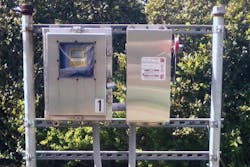The City of Geneva, Ohio, is in Ashtabula County, east of Cleveland, along Lake Erie. Founded in 1816, this picturesque city is now home to 7,000 residents. The City of Geneva Water Works Department is responsible for managing the city’s 350,000-gpd drinking water operation.
The City of Geneva’s water distribution system has an unusual history and structure. Ashtabula County bought its water system from a private utility in 2003; it includes booster stations and storage facilities, but no treatment plants. The county purchases finished water from the private utility’s treatment plant. The City of Geneva bought its water system in 2004; it is a distribution network connected within the county system. This system had no bulk metering to measure the city’s actual consumption. The city has been billed by Ashtabula County according to an agreed formula that apportions an amount of the overall county consumption to the city.
The Challenge
The Geneva Water Works Department determined that eight individual metering locations were needed around the city. The city management had several primary considerations when selecting a metering solution.
- Budget impact. As a smaller municipality, Geneva has a limited budget. This compels smart investment in affordable operational efficiency improvements. Securing the operational efficiency gains would depend on finding a very cost-effective solution. Most of the city’s water mains are in the road or right-of-way. An installation solution that could support the weight of vehicles was required, since rerouting pipelines away from traffic was financially infeasible.
- Ease of installation; minimal disruption. Geneva needed flowmeters that could be installed without the need for a line shutdown. Each of the metering sites is a connection to a county distribution artery that serves both the city and county consumers on the opposite side of the city. Shutting down these lines for a meter installation was not acceptable.
- Meter performance and bi-directional capability. To meet Geneva’s cost savings goal, a minimum of 1% accuracy was required. Additionally, the open nature of the distribution system allowed for water to flow in either direction in the pipelines. Therefore, a bi-directional metering capability was needed.
- Startup and calibration assistance. Since the city’s distribution system had no bulk water metering, the nominal flow rates within the pipes were unknown. It needed a partner on this project that would help it establish initial flow rates and calibration ranges.
- Aesthetics of solution. The City of Geneva needed to find a metering solution that maximized siting options. As a scenic, residential community, Geneva had to find locations for aboveground meter-reading stations that were close to primary electrical service but would not compromise the aesthetic appeal of its properties.
The Solution
The Geneva Water Works Department reviewed a number of technology options, ultimately deciding that an electromagnetic flowmeter would provide the accuracy and reliability needed. Different electromagnetic technologies were considered. The department concluded the McCrometer FPI Mag was the only solution that addressed all the challenges.
- Budget impact. Spool-type electromagnetic meters would require large vaults that would have to be installed away from traffic because they could not support vehicle loading. Rerouting water lines would greatly increase the cost and implementation time. The FPI Mag flowmeter’s compact insertion design is cost-effective for retrofit applications. Geneva used small manholes with “doghouse” cutouts. These manholes are fitted with metal covers designed to support the load of residential traffic. This installation technique avoided the expense and time of rerouting pipelines away from traffic. The FPI Mag can also be removed from pressurized pipes for easy inspection, cleaning, calibrating or verification without an expensive shutdown-and-restart sequence, thereby minimizing the cost of ownership.
- Ease of installation; minimal disruption. McCrometer’s FPI Mag flowmeter was a suitable solution for the City of Geneva’s ongoing operational requirements. Installation can occur without interrupting service, dewatering lines, cutting pipe or welding flanges. Geneva spent approximately five days installing each of the eight meters in lines ranging from 6 in. to 16 in. This included four days to install the manholes and provide electrical service to the new aboveground meter-reading stations. Installation of the FPI Mag full-profile sensor and electronic converter only took a combined half-day, including the pulling of wiring from the sensor to the converter at the meter-reading station.
- Meter performance and bi-directional capability. Accuracy was critical to meeting Geneva’s primary objective. The FPI Mag delivered on its accuracy requirements. The flowmeter’s streamlined sensor features multiple electrodes across the entire pipe diameter. This full flow profile measurement enables a very accurate average flow rate calculation. Its highly stable profile provides accuracy of ±.5% of reading, from 1 to 32 ft/sec velocity range, which rivals the performance of full-bore mag meters at a much lower total cost. Additionally, the availability of the bi-directional model also fit the city’s needs, allowing it to account for water regardless of the flow direction in its distribution system.
- Startup and calibration assistance. Due to the absence of bulk metering, Geneva was unable to provide McCrometer confident flow ranges for the factory calibration. Consequently, McCrometer used its NIST certified, full-flow test facility to calibrate the units to a reasonable maximum flow velocity for each pipe size down to a minimum velocity reflecting very low flows. After the meters were installed, Geneva and McCrometer worked together to confirm the calibration in the field using hydrant flows and individual consumer readings collected over a span of time.
- Aesthetics of solution. With the FPI Mag meters requiring such little installation space, Geneva gained multiple siting options that were aesthetically satisfying.
The Results
The Geneva Water Works Department concluded McCrometer’s FPI Mag full-profile insertion flowmeters met its accuracy, reliability and bi-directional requirements with an installation approach that satisfied its cost, siting and uninterrupted-operation needs. All eight McCrometer FPI Mag flowmeters were installed in aesthetically pleasing locations, in minimal time, with minimum investment and with no operational interruptions. They are all currently performing successfully, and in short order, the city’s goal of transitioning to an actual metered billing basis will be realized. Geneva anticipates operational cost savings of 8% to 12% per year as a direct result of its investment in the McCrometer FPI Mag flowmeter system.



